Monthly Archives: May 2015
Will’s comment here got me thinking about times in my customer service jobs when I refused to bend the rules but probably should have bent them. Here are two examples, both of which pertain to my time as a bank teller.
Example #1: A young girl, probably 8 or 9 years old, came in with a jar of loose change and wanted to use our coin counter. The rule was only account holders could use the counter. I refused to count the change because when I asked her if she had an account, she said no.
Example #2: A young man came in with a cashiers check for $1,000 made out to his mother. His mother had endorsed the check, and because his mother was a regular customer, I even recognized the signature as hers (or strongly resembling hers). I was reluctant to cash the check because I had never met this man before. (The rule in this case was quasi-unofficial. Theoretically, if the check is endorsed by the payee, it’s negotiable. But in practice, we wanted to be very sure before simply giving away so much money.) He said his mother was outside in his car, but according to him was very sick. I told him to bring his mother in so I could verify that it was her. He did, but as the bank was very crowded, they had to wait in line, and by the time they got back to my teller window, she was so weak she almost collapsed onto the floor and would have if her son hadn’t caught her.
I should have bent the rules in both cases. For example #1, I should have just run the coins through the machine. I don’t think the little girl cried, but she was probably upset or embarrassed that I didn’t help her. And I remember what it’s like being a kid and trying to negotiate an adult world with its seemingly arbitrary rules.
For example #2, I think I was right to insist to talk to the mother, although that is debatable because the signature was probably valid. But I could have said, “Bring her into the bank. You won’t have to wait in line. Just let her sit down and I can skip out of the teller line and verify with her.
I think in both cases the “rule” was defensible, or at least non-arbitrary. But enforcing them the way I did and with such consistency seemed and seems cruel.
Canada made the decision to close one of its borders in the night-time hours, which left residents of an eastern Alaska town in a lurch because there is no emergency care otherwise. Fortunately, they came to an arrangement.
According to Brookings, fracking is responsible for 47% of the fall in natural gas prices.
Everything you ever wanted to know about Tabasco Sauce. (Well, fifteen things.)
If you’re looking for a way to get rid of ants, you can’t get rid of them by getting rid of gravity.
According to a new book, addiction may not be what we think it is.
David Shultz wants to know if you’ll be able to read modern-day articles in 1,000 years, with an eye towards antiquated hardware. To answer his question, I think the answer is “yes” for text, due in large part from the transition from binary to marked up text. You won’t necessarily have the formatting, but you’ll have something readable. I’m less sure about image files, and skeptical about anything dynamic like video games or interactive anything.
Tom Lindsey writes about Texas’ ongoing effort to make college genuinely affordable.
Javier Grillo-Marxuach attributes the majesty of modern prestige television to bad parenting, MTV, and ADD-style editing.
Maybe I should talk less about Kansas City, and more about Fresno?
Discovered during my research: How America was named.
Ben Schwartz argues that we are in an age of a comedic bubble and satirical excess.
 Dave Schuler believes that, without a doubt, that George H Bush is our greatest living former president. A poll from last summer just about agrees, giving Bill Clinton higher approval but also higher disapproval. I am inclined to agree as well.
Dave Schuler believes that, without a doubt, that George H Bush is our greatest living former president. A poll from last summer just about agrees, giving Bill Clinton higher approval but also higher disapproval. I am inclined to agree as well.
Bush the Elder is getting more elderly. He turns 91 in a few months. Reagan and Ford lived to be 93, so he’s not exactly living on borrowed time. But he’s not looking really good, either.
In case you may not be away, his son Jeb is all-but-running for president. I am, personally, rather bearish on Jeb’s odds of becoming president. I am honestly not that bullish on his odds of even getting the Republican nomination. I know, I know, the GOP always dates the radicals and marries the establishmentarian, but this time feels different. More or less from the moment Huckabee announced he wasn’t going to run in 2012, I believed the nomination was Romney’s. I don’t feel that way about Jeb. He seems extremely out of touch about how out of touch he is with the party. He’s just proven to be a lackluster candidate so far, and this time around there are other options. I think he has a better chance than any other individual candidate, but if I were betting for or against him, I’d bet (lightly) against him.
 Unless, that is, his father dies sometime between now and then. Which gets me to the point of this post. His father is somebody that it’s become kind of hard to say much negative about, generally speaking. Republicans see him as one of their own and from the Reagan era at that. Democrats see him as fundamentally different from the current lot of Republicans. It’s considered poor taste to speak ill of the just dead, but I think there will be less tongue-biting.
Unless, that is, his father dies sometime between now and then. Which gets me to the point of this post. His father is somebody that it’s become kind of hard to say much negative about, generally speaking. Republicans see him as one of their own and from the Reagan era at that. Democrats see him as fundamentally different from the current lot of Republicans. It’s considered poor taste to speak ill of the just dead, but I think there will be less tongue-biting.
Which makes his father’s death, if it occurs between now and next November, a potentially important thing.
If it occurs during primary season, it could really give Jeb a boost. He may only need a boost. Just a bit of separation between him and everybody else. Rubio’s funding could then dry up. People looking for alternatives may stop looking. Then we may see a 1-on-1 race between Jeb and Walker or Jeb and Perry with the full weight of the Republican establishment squarely behind the son of the fallen hero.
If that doesn’t happen, and if Jeb wins the nomination, it could be salient in the general election, too. It’s become fashionable to view voters as these immovable objects who don’t respond to anything, but I don’t think that’s particularly true. There may not be as many independents and swing voters as there used to be, but they exist, they exist right on the margin, and their vote counts twice if they switch (-1 for the person they’re switching from, and +1 for the person they’re switching to). If it’s close, and it could be, it could help Jeb. Not only because Bush the Elder is his father, but because one of Jeb’s faults is that it feels like he’s running a 90’s campaign on the teen decade and though he physically takes after his mother, there does seem to be more of his father in him than there was in George W. It could also help reorient “The Bush Connection” away from the most unpopular living former president towards the least unpopular recently living president.
 The “cadillac tax” was billed by Jonathan Gruber as a backdoor to getting employers out of healthcare. Some House Democrats want to quash it.
The “cadillac tax” was billed by Jonathan Gruber as a backdoor to getting employers out of healthcare. Some House Democrats want to quash it.
President Obama is touting community colleges. That’s not the particularly cool part, though. The cool part is that he’s doing it in South Dakota. Thank you, Mr. President.
Some have grumbled at the obligation we have incurred by providing defense for the Marshall Islands, but Greenpeace says they’ve paid a price for it. And for those worried about the Maersk Tigris, while the administration and the Pentagon punted, it was released, and we’ve taken to escorting ships.
Norway is reducing the incentives to buy electric cars, and in response to Charlie Hebdo retiring it’s blasphemy law.
PRI shares the story of an American who saved 250,000 people during the Armenian genocide.
Putin and Medvedev have been comparing their annexation of Crimea to the reunification of Germany, but some historians take issue with that.
Maybe it’s just me, but if you’re somebody that has (a) stolen a bike and (b) disemboweled a Portland man, you are a “Disemboweler who stole a bike” rather than a “Bike thief to disemboweled a Portland man.”
One of Montana’s most wanted is caught when he “likes” his most wanted poster on Facebook.
A woman’s daughter dates her mother to kiss a random, good-looking stranger. Which she does, and then tries to use social media to catch his attention, and caught his wife’s instead.
An aide to California Attorney General Kamala Harris is evidently part of a secret society dating back to… well there’s some confusion over that.
Montana joins New Mexico in clipping the wings of asset forfeiture.
An employee at a Waffle House in Georgia was caught on camera pleasuring himself. The only thing missing from this perfect story are the words “… in celebration of his favored SEC team winning a championship.”
Jesse Walker wrote an opinion piece on Jade Helm 15 for the LA Times, which a publication in the UAE reproduced… except they cut off the second half, leaving it on a pretty ominous note.
Liberland, mentioned last week, had a good run, but that run is at an end as the nation was invaded and its president arrested by Croatia. Here’s an interview.
A flight from Florida to Portland was diverted to Salt Lake City after a tantrum by a teenager with autism who wanted/needed hot food.
Burt Likko responds to Kristin Powers, speaking of how universities can walk the line between free speech and hostile-environmentalism. Powers says that official speech codes are the worst, and Likko goes into the legalities involved.
I don’t know what they taught at Georgetown, where Ms. Powers went to law school, but I know at my own law school, anti-discrimination law was not taught as something that had all that much Constitutional implication. A significant lacuna in my professors’ presentation of anti-discrimination law. As a newly-minted attorney I believed, because I had been taught, that anti-discrimination statutes were an unambiguous good and a moral imperative upon the body politic to enact. The corpus of larval lawyers of which I was then a member had been exhorted: “Go ye forth, and enforce these laws, through civil litigation!” Such preaching convinced me — a younger, more conservative version of me than the me actually practicing this brand of law today — that being a private attorney general like this would be a way to simultaneously seek both personal enrichment and public justice.
Turns out, soon after picking up that banner I encountered defendants who protested, “Don’t I have freedom of speech?” The answer is, “Not if your speech creates a hostile workplace environment, you don’t.” Which sat uncomfortably with me because freedom of speech is important, too. So there has to be some point of balancing if we are to have both a discrimination-free environment and freedom of speech for individuals.
I think Powers is wrong. Speech codes are talked about because they sound scary, ominous, and Orwellian. The bigger concern I personally have is among the student body, and more importantly how the universities respond to the views of the student body.
I’m less worried that schools are going to formally declare that certain words and thoughts are out of bounds than I am that administrators will indulge student bodies’ determinations of what’s reasonable by using the powers they invariably have. There’s no question that universities have the power to, for instance, decide who to pay to bring to campus to speak at a commencement or other event. They are responsible for recognizing clubs, and in many cases forming them. If they’re doing their job, they or one of their subsidiaries arrange student events of all kinds. They permit, or don’t permit, displays on campus. Often, as a practical matter, they have to limit who can do what, because not everyone can always be accommodated even if everything is completely viewpoint-neutral.
But it doesn’t have to be viewpoint-neutral. And if it’s not, it doesn’t have to come out and admit it.
Over at Ordinary Times, I briefly became the symbol of millenial-hatred by refusing to automatically grant the protests over American Sniper as being reasonable. Maybe they were, if it was just a matter of the time and place of the screening. That, you know, it wasn’t the showing of the movie but the showing of the movie at this particular mixture. But controversies erupted at the University of Maryland and George Mason over special screenings, and people at Eastern Michigan actively disrupted a screening there. So I still don’t think it’s unreasonable to interpret these objections not as “Can’t we have a mixer without this movie?” but “I don’t want this movie to be shown on campus.” You can “how about not doing that here” something into being nowhere.
The UMd and GMU stories have happy endings, only because the universities or other student groups stepped up to make sure that it happened. That only happened because of the backlash, and past performance is no guarantee of future results.
The left is experiencing a cultural apex at the moment, especially at universities, and seem to be wondering why they should have to tolerate speech that they’re not comfortable with when can theoretically have the tools at their disposal to displace it without actually having to go afoul of the First.
It can become even harder if things reach a certain tipping point, where people with unpopular ideas simply stop speaking up. The window of socially acceptable dialogue – even if protected by Freedom of Speech – can move to the point that young people who voted for the side that just won a national election feel the need to keep their views to themselves.
Here in the University of North Carolina student paper expressed grave disappointment that Duke University invited Mitt Romney to speak at their campus. Romney, who came within a few million votes of becoming the President of the United States and Commander-in-Chief of its military.
Just as they concede with Romney and David Horowitz, who the piece is primarily about, have a right to free speech, I will concede that the Tar Heel has a right to run stupid editorials. The University should not pull its funding and they should not be thrown in jail. Like I said, this isn’t especially about the First Amendment. It’s not that the Universities will shut down speech. It’s that they’ll stop stopping the students and some faculty from running speech off.
One of my pet peeves is people who complain that college football is just NFL-lite and then proceed to complain about all of the ways college football is different (no/small playoff, unpaid players, too many teams, teams lose money…). I thought about that when I read the complaints of Tom Cable, a line coach for the Seattle Seahawks:
“I’m not wanting to offend anybody, but college football, offensively, has gotten to be really, really bad fundamentally,” Cable said Tuesday on 710 ESPN Seattle radio. “Unfortunately, I think we’re doing a huge disservice to offensive football players, other than a receiver, that come out of these spread systems.
“The runners aren’t as good. They aren’t taught how to run. The blockers aren’t as good. The quarterbacks aren’t as good. They don’t know how to read coverage and throw progressions. They have no idea.”
As Costa Tsiokas says…
then start an #NFL D-League for players to bypass NCAA || College Spread Offenses Are 'Really Bad Fundamentally' http://t.co/udJ5s6J2e9
— Costa Tsiokos (@CostaHere) May 12, 2015
That teams without the “fundamentals” are winning championships suggest that the “fundamentals” aren’t that fundamental at that level.
College football is not actually there to prepare players for the NFL. The vast majority of players have no NFL career ahead of them. The vast majority of them know it.
On the other hand, a fair number of players are hoping for a shot to play on Sundays. It is entirely possible at some point that those players will start defaulting to programs that will make them more desirable to NFL teams, if those teams start discriminating during the draft.
And it’s not entirely the job of college football coaches to prepare players for the NFL. Or, at least, that job is secondary to actually winning games. And the rise of the spread has occurred as a bottom-up phenomenon, with lower conferences and lower teams in major conferences using it for their competitive advantage. It managed to rise because it was relatively effective, putting programs like Baylor on the map. If other programs need to adapt in order to win games, they’re going to do that. Because one of the reasons for its success is that it has allowed teams with inferior talent to beat teams with superior talent.
For now, at least. There are a lot of fads in offenses that last only as long as it takes for defenses to catch up with them. There used to be the Veer, and then the Run and Shoot, and both of those went down as defenses adapted. Will that happen with the Spread? History suggests it will, but it’s been a while and it hasn’t yet.
So anyway, Costas is correct. If the NFL wants a development program, they need to pay for one. Of course, I would say that, as I’ve been saying for a while that we do need to better differentiate between student athletes and those preparing for a career.
 As overboard as I believe our CPS goes sometimes, at least we aren’t Britain, where parents are being warned that they will be reported if kids play the wrong video games.
As overboard as I believe our CPS goes sometimes, at least we aren’t Britain, where parents are being warned that they will be reported if kids play the wrong video games.
The standard model of physics isn’t providing all of the answers that we need. Here’s how we’re trying to bridge the gap.
Residents are doing what it can to keep college students, the young poor, and the poor more generally, out of Bellevue, Washington. This shouldn’t be necessary, though, because developers only want to build luxury condos, right? (I am a localists in some respects, but it’s becoming increasingly apparent to me that housing accommodations as a local matter create problems.)
I collect 3D-generated landscape images. It’s a hobby. I’ve subscribed to Digital Blasphemy, Mike Bonnell, and others. This geyser in Nevada makes me think of those, except it’s real!
This story, about a man who refused to stop and help an injured person on the side of the road that turned out to be his mother, sounds like a contrived TV show plot.
News I can use: Facts about urine, including how to train yourself to pee less often.
Scott Mandelson argues that Hollywood needs to do less remakes and more rip-offs. I agree from a cultural perspective, though from a financial perspective you want to retain the original audience. Remake-mania isn’t about a lack of ideas but an overabundance of caution.
UFOs are apparently most prevalent in the west.
Tour an 80’s-era abandoned mining town.
I disagreed with Sonny Bunch about women in comic books. The more I’ve read about recent efforts, though, the more I am thinking he might have been more right than wrong in some respects.
I wrote a piece about the UK elections Over There. Feel free to comment about it here.
One thing I didn’t get in to was the polling. Not much to be said other than that the polling was really, really bad. And a desire to go back in time to the run-up to 2012 when any and all skepticism of polling was a form of science denialism. But Nate Silver has been doing a good job – since last year, actually – of pointing out some of the problems we’ve been seeing with polling. One of the bigger problems being herding.
As if right on cue, a pollster admits they threw out correct results because they weren’t in line with what they were hearing elsewhere:
Survation Telephone, Ballot Paper Prompt:
CON 37%
LAB 31%
LD 10
UKIP 11
GRE 5
Others (including the SNP) 6%
Which would have been very close to the final result.We had flagged that we were conducting this poll to the Daily Mirror as something we might share as an interesting check on our online vs our telephone methodology, but the results seemed so “out of line” with all the polling conducted by ourselves and our peers – what poll commentators would term an “outlier” – that I “chickened out” of publishing the figures – something I’m sure I’ll always regret.
So in short, there will be no internal review of polling methodology for Survation post this General Election result.
Consider this quote from an essay by Leon Fink, a labor historian:*
[Andrew] Carnegie, of course, was the protagonist of the Homestead Strike of 1892, a fateful standoff between one of the biggest corporations and the most powerful union of the Gilded Age. When the Amalgamated Association of Iroon and Steel Workers (AAISW) together with an aroused local citizenry proved unable to withstand a combination of lockout, importation of Pinkertons to protect strikebreakers, and ultimate application of state militia, unionism took a toll beyond the immediate causalities of nine dead and eleven wounded. In the steel industry, declining wages and yellow-dog contracts requiring a binding non-union pledge subsequently became the norm. Overvaluing its remaining resources, the Amalgamated made a final, fateful decision to confront the newly formed U.S. Steel monolith [the successor to Carnegie’s concerns, which he sold to J. P. Morgan] in 1901, a decision ending in crushing defeat. Once the last steel lodge in the country dissolved, Big Steel inoculated itself from trade unionism for the next thirty-four years. [citations omitted]
The “importation of Pinkertons,” which were private security guards, and “the application of state militia” reflect something one sees often in narratives about Gilded Age (c. 1877-c.1920) labor disputes. The idea is that unions could have had more success if it weren’t for violent interference from the state. “Success,” at least when counterposed to the above-mentioned use of Pinkertons and the militia, meant that the strikers would be permitted to harm or threaten strikebreakers, to use violence to prevent strikebreakers from taking jobs that “belonged” to union members.
Before I go too far in decrying “union violence” in the Gilded Age there are two counterpoints. First, in the example of Homestead and many other examples, introducing strikebreakers was a provocative move, an invitation to the very violence that often followed. To be clear, blame for any violence rests with those who actually commit the violence. But if someone introduces a situation they know will lead to violence that person also bears some of the blame for the results.
Second, if you look at the history of labor activism, one finds violence directed against strikers or union supporters either without provocation or with flimsy justifications. The examples are many: Henry Ford’s hiring thugs to beat up union organizers, the Republic Steel Massacre, the Ludlow Massacre, the deportations and bull-pen imprisonments during the “Colorado Labor Wars” of 1902-1905. I wouldn’t be surprised if such violence counts for a majority of the instances of “labor violence” during the Gilded Age.
So why pick on anti-strikebreaker violence, especially at a time when unions in most sectors seem to be so poorly represented and when most union supporters (I imagine) today disavow violence and do so sincerely?
One reason is a preachy one. I want to point out that such violence is illiberal. If “liberal society” means anything, it means that a person has the right to pursue a lawful calling for which someone else is willing to lawfully hire them. Maybe other norms ought to override at least sometimes this liberal presumption–such as “community interest,” a notion that jobs are “owned” by the jobholder, a commitment to class solidarity, or a shared opposition to an allegedly monopolistic octopus. And perhaps those norms deserve consideration.
Another reason is, the issue of violence is a more extreme version of the issue of when and whether and how employment relations can be said to be voluntary or coercive. And as one of my interests is labor policy and labor history, I’d like to put the issue of violence out there.
For union supporters, I’d like to ask when, if ever, is it acceptable to use violence and to deter strikebreakers? other forms of coercion to impose or establish a union contract? and what counts as violence and “other forms of coercion”? For opponents of unions, I’d like to ask if anything overrides what I call the “liberal presumption” that each person has a right to pursue a lawful calling? and when and by how much is that presumption overridden?
These are questions that bother me as I try to consider my stance on, for example, the repeal of Taft-Hartley, curtailing public employee unions, anti-union shop (aka “right to work) laws, card check votes, or such workplace related policies like Montana’s “for cause” employment law or raising the minimum wage.
*From Leon Fink, “Great Strikes Revisited,” in The Long Gilded Age: American Capitalism and Lessons of a New World Order (Philadelphia: University of Pennsylvania Press, 2015), page 38.
This is a setup for an OT post on the UK election.
It’s actually a little bit too simplistic to say that “Well, what happened was that the parties reversed themselves from liberal to conservative and vice-versa.”
There is some of that, particularly in the South, but the Great Plains and Mountain West states weren’t particularly conservative, at least as far as economics goes. They voted for William Jennings Bryan, who wasn’t exactly a conservative Democrat. The explanation does carry some weight when it comes to social issues (WJB being famous for arguing against evolution). But one of the stories here is that conservatism won these regions. There is still a degree of economic populism in these states, but that has taken a back seat to cultural alignment.
It actually makes me wonder if there isn’t a lesson here in future realignment, if the Emerging Democratic Majority holds and we need a whole new realignment to get to two parties. It actually wouldn’t surprise me if some of the economic liberally states don’t start pulling back, and some of the current conservative states realize that they need a robust national government. It’s not the most likely scenario, but I could sort of see it. Maybe.




